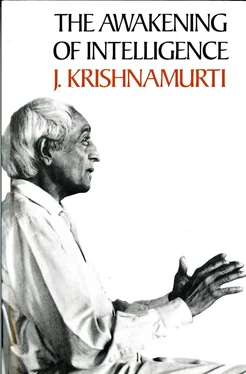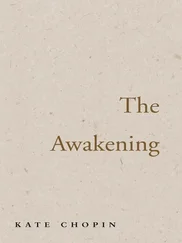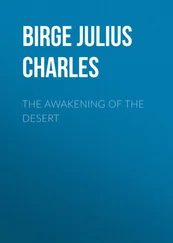1 ...7 8 9 11 12 13 ...29 KRISHNAMURTI: We will go into this. A man who goes to a factory every day, day after day, and finds release in drink and all the rest of it . . .
Needleman: This is the example of a poor environment, a bad tradition.
KRISHNAMURTI: So what does the man who is intelligent, who is concerned with changing the environment, do for that man?
Needleman: Perhaps he is changing the environment for himself. But he understands something about man in general. I am talking now about a great teacher, whatever that is. He helps, he presents a way of life to us which we don’t understand, which we haven’t verified ourselves, but which somehow acts on something in us to bring us a little together.
KRISHNAMURTI: That is satsun , which is the company of the good. It is nice to be in the company of the good because we won’t then quarrel, we won’t fight each other, we won’t be violent; it is good.
Needleman: All right. But maybe the company of the good means that I will quarrel, but I’ll see it more, I’ll suffer it more, I’ll understand it better.
KRISHNAMURTI: So you want the company of the good in order to see yourself more clearly?
Needleman: Yes.
KRISHNAMURTI: Which means you depend on the environment to see yourself.
Needleman: Well perhaps in the beginning.
KRISHNAMURTI: The beginning is the first step and the last step.
Needleman: I don’t agree.
KRISHNAMURTI: Let’s go into it a little bit. See what has happened. I go with good men because in that ambience, in that atmosphere I see myself more clearly, because they are good I see my idiocies.
Needleman: Sometimes it happens that way.
KRISHNAMURTI: I am taking this.
Needleman: That is one example, right?
KRISHNAMURTI: Or I am also good, therefore I live with them. Then I don’t need them.
Needleman: No we don’t need them then. All right.
KRISHNAMURTI: If I am good I don’t need them. But if when I am not good and come into their presence, then I can see myself clearly. Then to see myself clearly I must have them. This is what generally takes place. They become important, not my goodness. This happens every day.
Needleman: But is there not such a thing as weaning the baby by blackening the breast? It happens that I do need these men, maybe in the beginning.
KRISHNAMURTI: I am going to question it, I want to find out. First of all, if I am good I don’t need them. I am like those hills and birds which have no need.
Needleman: Right. We can rule that out.
KRISHNAMURTI: When I am not good I need their company, because in their company I see myself clearly; I feel a breath of freshness.
Needleman: Or how bad I am.
KRISHNAMURTI: The moment I have a horror of myself, in the largest sense of the word, I am merely comparing myself with them.
Needleman: No, not always. I can expose the image I have of myself as a lie.
KRISHNAMURTI: Now I am questioning whether you need them to expose yourself as a liar.
Needleman: In principle, no.
KRISHNAMURTI: No, not in principle. Either it is so, or it is not.
Needleman: That is the question.
KRISHNAMURTI: Which means if I need them, then I am lost. Then I will for ever hang on to them. Sir, this has happened since human relationships began.
Needleman: Yes it has. But it also happens that I hang on for a while and then I right it.
KRISHNAMURTI: Therefore why don’t you, the good man, tell me: “Look, begin, you don’t need me. You can watch yourself now clearly.”
Needleman: Maybe if I told you that, you would take it utterly wrongly and misunderstand me completely!
KRISHNAMURTI: Then what shall I do? Go on hanging onto you, run after you?
Needleman: Not what shall you do, but what do you do?
KRISHNAMURTI: What they generally do is run after him.
Needleman: They generally do, yes.
KRISHNAMURTI: And hold on to his skirts.
Needleman: But that is perhaps because the teacher is not intelligent.
KRISHNAMURTI: No. He says, “Look, I can’t teach you my friend, I have nothing to teach. If I am really good I have nothing to teach. I can only show.”
Needleman: But he doesn’t say it, he does it.
KRISHNAMURTI: I say, “Look I don’t want to teach you, you can learn from yourself.”
Needleman: Yes, all right. Suppose he says that.
KRISHNAMURTI: Yes, he says learn from yourself. Don’t depend. That means you, being good, are helping me to look at myself.
Needleman: Attracting you.
KRISHNAMURTI: No. You are putting me in a corner so that I can’t escape.
Needleman: I see what you are saying. But it is the easiest thing in the world to escape.
KRISHNAMURTI: I don’t want to. Sir, you tell me, “Don’t depend, for goodness has no dependency.” If you want to be good you cannot depend on anything.
Needleman: Anything external, yes all right.
KRISHNAMURTI: On anything, external or inward. Don’t depend on anything. It doesn’t mean just don’t depend on the postman, it means inwardly don’t depend.
Needleman: Right.
KRISHNAMURTI: That means what? I depend. He has told me one thing: “Don’t depend on me or on anybody, wife, husband, daughter, politician, don’t depend.” That’s all. He goes away. He leaves me with that. What shall I do?
Needleman: Find out if he is right.
KRISHNAMURTI: But I do depend.
Needleman: That’s what I mean.
KRISHNAMURTI: I do depend on my wife, on the priest, on some psycho-analyst—I do depend. Then I begin. Because he tells me the truth—you follow, Sir? It is there, I have to work it out. So I have to find out if it is the truth, or if it is a falsehood. Which means I must exercise my reason, my capacity, my intelligence. I must work. I can’t just say, “Well he has gone”. I depend on my cook! So I have to find out, I have to see the truth and the false. I have seen it. That doesn’t depend on anybody.
Needleman: Right.
KRISHNAMURTI: Even the company of the good doesn’t teach me what is good and what is false, or true. I have to see it.
Needleman: Absolutely.
KRISHNAMURTI: So I don’t depend on anybody to find what is true and what is false.
MALIBU, CALIFORNIA
26 MARCH 1971
AMERICA
II
Three Talks in New York City
1Inner revolution
2Relationship
3Religious experience. Meditation
1
INNER REVOLUTION
The need to change. A process in time or instantaneous? The conscious and the unconscious; dreams. The analytical process. To see the content of consciousness without the separation of observer and observed. Noise and resistance. “When there is complete cessation of division between the observer and the observed, then ‘what is’ is no longer what is”
Questions: Observer and observed; fragmentation; resistance .
KRISHNAMURTI: We are going to examine together the question of what is hidden in the consciousness, in the deeper layers of the mind—which is generally called the unconscious. We are concerned with bringing about a radical revolution in ourselves and so in society. The physical revolution which is advocated all over the world at the present time does not bring about a fundamental change in man.
In a corrupt society, such as this, in Europe, India and elsewhere, there must be fundamental changes in the very structure of society. And if man remains corrupt in himself, in his activity, he will overcome whatever the structure be, however perfect; therefore it is imperative, absolutely essential that he change.
Читать дальше












